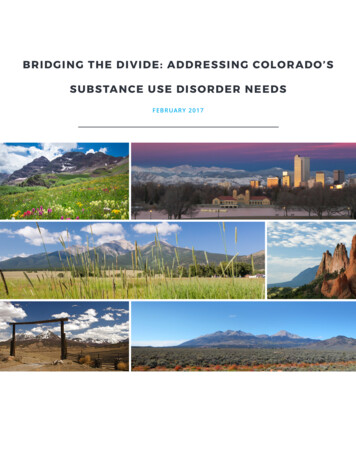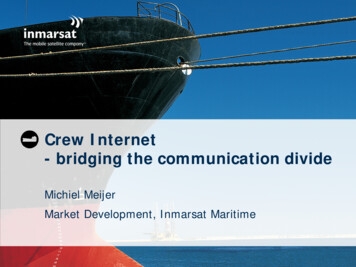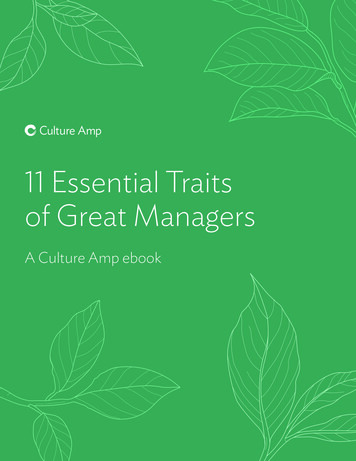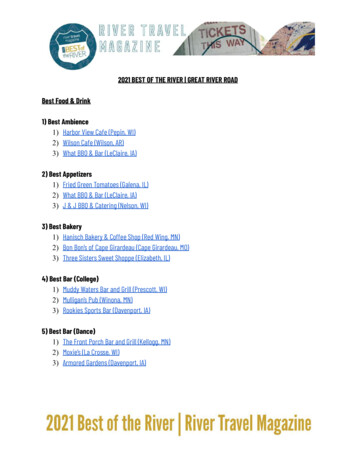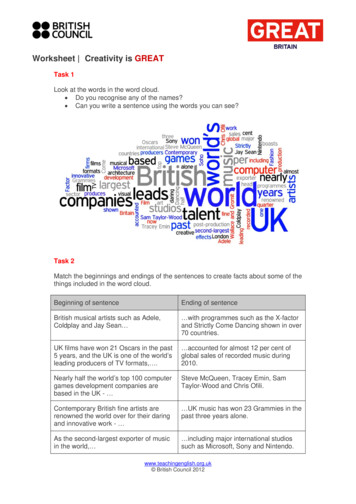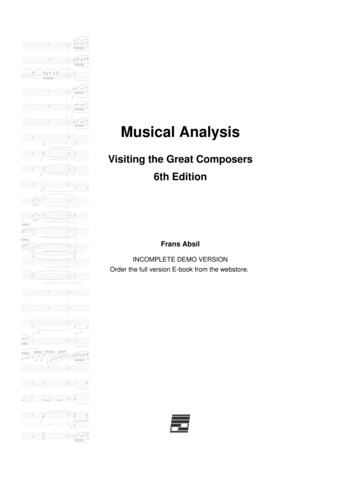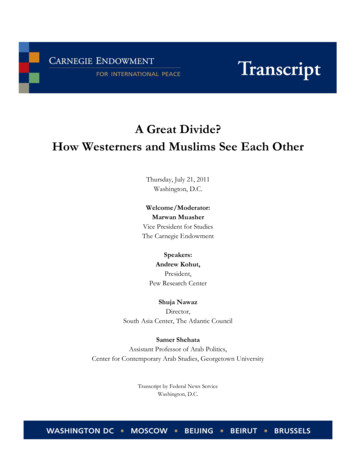
Transcription
A Great Divide?How Westerners and Muslims See Each OtherThursday, July 21, 2011Washington, D.C.Welcome/Moderator:Marwan MuasherVice President for StudiesThe Carnegie EndowmentSpeakers:Andrew Kohut,President,Pew Research CenterShuja NawazDirector,South Asia Center, The Atlantic CouncilSamer ShehataAssistant Professor of Arab Politics,Center for Contemporary Arab Studies, Georgetown UniversityTranscript by Federal News ServiceWashington, D.C.
Transcript Not Checked Against DeliveryMARWAN MUASHER: OK. I guess we‟re ready to start. If you can please take yourseats. Thank you very much for being here today. We‟re here to discuss, of course, a new PewResearch Center report on findings of attitudes of Western and Muslim publics towards each other.We are looking at this 10 years after 9/11 and want to look at how the relationship and attitudeshave evolved in the 10 years that divide us from 9/11.[00:00:43]And we have with us a number of experts. I must first say that this event is cosponsoredwith the Pew Research Center, and we have with us the president of the Pew Research Center, Mr.Andy Kohut, who will be presenting the findings followed by experts from the region to discussthese findings and to have a discussion, also, with you.Andrew Kohut is president and founder of the Pew Research Center. He has been formerlythe president of the Gallup Organization and the founding director of surveys for the Times MirrorCenter. He also received in 2005 the American Association of Public Opinion Research highesthonor, the Award for Exceptionally Distinguished Achievement.To my immediate left, we have Mr. Shuja Nawaz, who is the director of the AtlanticCouncil‟s South Asia Center, who will be also commenting on the findings of the Pew survey. Hehas worked with numerous think tanks on projects dealing with Pakistan and the Middle East. Heserved as the director of the International Atomic Energy Agency in Vienna, worked for the WorldHealth Organization, the World Bank and The New York Times and has most recently authored thebook “Crossed Swords: Pakistan, its Army, and the Wars Within.”And to my immediate right is Dr. Samer Shehata, an assistant professor of Arab politics atGeorgetown University‟s Center for Contemporary Arab Studies. He has served as acting directorof the Masters of Arts in the Arab Studies Program. He was also director of graduate studies atNew York University‟s Center for Near East Studies and he is the editor of a forthcoming book,“Islamist Politics in the Middle East: Movements and Change.”Mr. Kohut will present the findings for about 10 minutes. We will allow each of the paneliststo have a 10-minute presentation or commentary on these findings and then open up to questionsfrom the audience. So Andy, the floor is yours.[00:03:00]ANDREW KOHUT: Well, let me extend a thank you to you all for joining us. There‟snothing better from a speaker‟s point of view than a hot and hungry audience. (Laughter.) There‟s agreat disincentive to leave. It‟s very hot out there and you don‟t want to miss lunch. So I‟m feelingvery confident – (laughter) – that this is really going to be a good one. OK.What I‟d like to do is tell you, first tell you some things about what this survey showed andthen show you a few pictures that illustrate the key findings. Five years ago, we undertook a surveyto examine how Western and Muslim publics viewed each other. Our lede in the report was asfollows: most Muslims and Westerners say that relationships are generally bad. Many in the West
Transcript Not Checked Against Deliverysee Muslims as fanatical, violent and as intolerant. Muslims in the Middle East and Asia seeWesterners as selfish, immoral and greedy – as well as violent and fanatical.The timing of that survey followed a year marked by riots over cartoon portrayals ofMohammad in Denmark, I believe, a major terrorist attack in Britain, not to mention continuingwars in Iraq and Afghanistan. Things over the past year have – in 2010, leading up to 2011 –haven‟t been nearly as fractious, at least from a Western point of view. We are winding down to onewar.But you know, the lead findings of our survey in 2011 are almost identical to what we foundin 2005. They‟re unchanged with regard to stereotyping and with regard to basic attitudes. Muslimand Western publics continue to see relationships between them as not so good – in fact, bad – andboth sides continue to hold the negative stereotypes that I described from our 2006 survey.[00:05:08]Obviously, given the permanence of these views over this period of time, I think weconclude that these are pretty – this is pretty much of an intense – an entrenched divide. But I‟dlove to hear how our panelists and commentators feel about that.Let me start with one chart which shows you what we – who we questioned. In the Muslimnations, predominantly Muslim nations, were Turkey, Egypt, Jordan, Lebanon, the Palestinianterritories, Indonesia and Pakistan. Those are our – the countries we typically go back to year in andyear out in the Pew Global Attitudes Project. We also had a survey of Israeli Arabs. Weoversampled them to get an adequate size.In the West, most of the references are between attitudes of Americans, the Brits, French,Germans and the Spanish. But we also have a – included in the survey some – these questions werealso asked of Russians and Israelis. And we make some references there.Moving away from the chart for a while, let me just tell you a little bit about what the surveyshowed, then we can come back to the charts. Now, while there were a lot of similarities betweenour findings this year and „06, we did see one thing that is encouraging, and that is a modest thaw inattitudes in the U.S. and in Western Europe toward Muslims. Compared with 2006, a greaterpercentage of Western publics now see relationships as good, but the Muslims we polled were asinclined to say relationships are generally bad as they were five years ago.And as in the past, Muslims express more unfavorable opinions about Westerners thanAmericans or Europeans express about Muslims. And that – there‟s a consistency to that across anumber of questions.[00:07:12]Similarly, more Muslims associated negative characteristics with Westerners than was thecase vice versa. In Jordan, Turkey, the Palestinian territories, Pakistan and Indonesia,supermajorities used at least three of the six negative terms to describe Americans and WesternEuropeans. In contrast, in the West, only in Spain did we find a majority using negative stereotypingwith respect to Muslim people.
Transcript Not Checked Against DeliveryFor the most part, Muslims and Westerners finger-point about the “why” to the problems,what‟s behind it and which side holds the higher ground on key issues. Muslims in the Middle Eastoverwhelmingly blame – and Asia – overwhelmingly blame the West for bad relations. However,while Americans and Europeans tend to blame Muslims, there is more – you see a greaterpercentage of Europeans and Americans saying, well, the problem rests here. You don‟t see that inthe Muslim countries.[00:08:19]Muslim – the Muslim publics in this survey, as they did five years ago, have an aggrievedview of the West. They blame Western policies for their own lack of prosperity. Fewer Americansor Western Europeans think that it‟s Western policies which are holding down the economies of theMuslim countries in which we polled in. They point to government corruption, lack of democracy,lack of education and, to some extent, to a lesser extent, Islamic fundamentalism.Perhaps reflecting the Arab Spring this year, in several Muslim and Western nations, morethan in ‟06, lack of prosperity was identified – lack of prosperity stemming from a lack of democracyrose in the current survey.More broadly, what we found was that in four of six western nations, majorities say theyhave a positive view of Muslims. The exceptions are Germany, where only 45 percent have afavorable view, and Spain, where only 37 percent have a favorable view. Both of these numbers area little bit better than they were five years ago. I might add that in Spain, views of Jews are notparticularly positive either, and they haven‟t been for much of the course of the time we‟ve beendoing this polling.Muslim views toward Christians vary considerably, given the mix of countries that we havehere. Ninety-six percent of the Lebanese Muslims have a – express a positive view of Christians,and that‟s not surprising, given the Christian population there. Narrow majorities of Jordanians andIndonesians also give Christians a positive rating.But not so in Egypt. Just 48 percent say – have a favorable view of Christians. And inPakistan and Turkey, very few indeed – 16 (percent) and 6 percent, respectively, have a positive viewof Christians.Now, there is one point of consensus that comes out of this survey between Muslims andWesterners, and that is, they share concerns about Islamic extremism. Solid majorities across U.S.and Europe and Israel are concerned about this in their country and solid majorities in Palestine,Lebanon, Egypt, Pakistan and Turkey express the same worries.[00:10:45]I‟ll just add a few other findings and then show you some slides. A decade later, mostMuslims in the nations we surveyed say they don‟t believe that a group of Arabs carried out the 9/11attacks. In fact, there‟s no – there‟s no Muslim public in this survey where even 30 percent of Arabsaccept this notion that it was Arabs who carried out this attack.
Transcript Not Checked Against DeliveryThis is, in my view, one of those “gee-whiz” findings. I remember when I first heard it, itwas – came out of a Gallup survey conducted either in late 2001 or early 2002. And I thought, well,that would change. Well, it hasn‟t changed. The views that it – the attack was not carried out byArabs persisted into our 2005 survey. And I think they‟re persisted in the Gallup surveys. And inpoint of fact, fewer of our respondents in 2011 took this view than did in 2005.In the West, there‟s a widespread perception that Muslims living in the West do not want toassimilate. When we do surveys here in the United States among Muslims, that is hardly the truth.There‟s a great desire for assimilation, but it‟s not acknowledged by the broader American public.We‟ll be doing an update of those surveys – that survey pretty soon. I think you‟ll be interested in it.There are competing views between Muslim publics and Western publics about how womenare treated. Each culture says women are not respected in the other culture. But Westerners aremore critical of Muslims than Muslims are of Westerners.[00:12:35]In that regard, there are significant gaps in the way Westerners and Muslims see women.Our polling in 2010, when we did this in considerable detail, showed that a considerable number ofMuslims continue to think that men make better leaders than women. That‟s not the case inWestern countries, where it‟s not, at least, expressed as the case in Western countries. And there‟sstill less acceptance of women in the workplace in Muslim countries than there is in the West.Those are some of the key findings. And let me just show you some of this, and maybe it‟llbring it home a little bit better. Here is the percentage saying that Western – that relationshipsbetween the two peoples are bad. And as you can see, it declines by 15 points in Russia, from 53 to38, and it‟s down in Britain, Germany, the U.S., marginally and in France and Spain.It‟s down significantly in Indonesia. This is part of what I think is the Obama effect.Indonesians are much more positive about America and many things Western since Obama waselected. But you can see, there‟s not much change in Egypt, Jordan. And in fact, in Pakistan, nottoo surprisingly, given what our other surveys showed, there‟s a 20-point jump in the numberssaying that relationships are bad.Who‟s to blame? In the West, it‟s mostly, Muslims are to blame, but significant numbers –26 (percent), 29 percent in Britain and the U.S. and 27 percent even in Russia, say it‟s Westernpeople. In the – in the Muslim countries, very little mention of Muslims to blame. It‟s mostlyWestern people and significant numbers volunteer, it‟s Jews.[00:14:33]Here are the characteristics that I mentioned when I started the talk. Sixty-eight percent ofthe Muslim respondents – this is the median average across a lot of countries – say that Muslim –Westerners are selfish, 66 percent, violent, greedy and immoral, arrogant, fanatical – wow – just 44percent respectful of women and small percentages saying positive things such as honest, tolerantand generous.
Transcript Not Checked Against DeliveryWestern views are negative with respect to violence and fanatical, but they‟re not nearly asnegative as are the Muslim views. And in fact, I – you know, I could just leave it at that.[00:15:21]When you summarize these findings, you see that three or more negative mentions were theprevailing view in each of these Muslim countries. But except in Spain and to some extent Russia,this – there weren‟t a lot of negative – concentration of negative views in Western – in non-Muslimcountries.Why the lack of prosperity? Muslim publics, 53 percent on average say U.S. and Westernpolicies; only 14 percent of the Western countries say that; government corruption, there‟s moreagreement; lack of democracy, there‟s more consensus, and lack of education; and a third ofWesterners say Islamic fundamentalism.Here‟s the: Do you believe Arabs carried out the 9/11 attacks? Again, this is the median –well, here‟s – these are the actual responses: in Jordan, just 22 percent, down from 39 percent in2006; in Turkey, 16 percent, down from – 9 percent down from 16 percent then. And the numbersare very, very small; very few – very few say it was Arabs that carried out the 9/11 attacks. We‟veseen this before; Gallup has shown this and, in fact, I think it‟s pretty much a Gallup question.So those are our key findings and what I th
book “Crossed Swords: Pakistan, its Army, and the Wars Within.” And to my immediate right is Dr. Samer Shehata, an assistant professor of Arab politics at Georgetown University‟s Center for Contemporary Arab Studies. He has served as acting director of the Masters of Arts in the Arab Studies Program. He was also director of graduate studies at New York University‟s Center for Near East .
